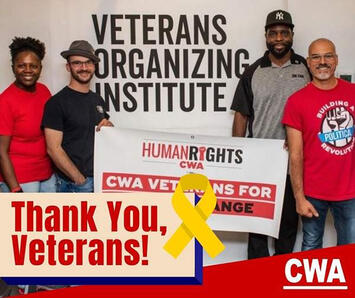
Even in the era of identity politics, one category of identity has largely been ignored: what UK journalist Joe Glenton calls “veteranhood.”19 million former soldiers — most of them working class — share a strong sense of personal identity as vets, but the media usually notices them only when they are involved in right-wing militias, white supremacist groups, and other MAGA-land formations. Some have noted their over-representation in U.S. law enforcement, which does reinforce militarized policing, along with the better known Pentagon-to-police equipment pipeline.
Largely ignored is the positive role veterans from working-class backgrounds have played in key labor and political struggles since the mid-20th century. In the heyday of industrial unionism in the 1950s and ‘60s, tens of thousands of World War II veterans could be found on the front-lines of labor struggles in auto, steel, electrical equipment manufacturing, mining, trucking, and the telephone industry. Today, about 1.3 million former service members work in union jobs, and women and people of color make up the fastest growing cohorts in these ranks.
Veterans are, according to the AFL-CIO, more likely to join a union than non-veterans. In a half dozen states, 25% or more of working veterans belong to unions. Vermont AFL-CIO President David Van Deusen sees veterans as “an underutilized resource for the labor movement,” particularly in high-profile organizing campaigns. No one, he believes, is better positioned to “expose the hypocrisy and duplicity of ‘veteran-friendly’ firms like Amazon and Walmart, who wrap themselves in the flag, while violating the rights of working-class Americans who served in uniform and the many who did not.”
That’s why former SEIU organizer Jane McAlevey recommends that unions today learn from the example of the Congress of Industrial Organizations (CIO) in the post-war era. . CIO organizers understood that former soldiers have “strategic value” in strike-related PR campaigns. Veterans also have “experience with discipline, military formation, and overcoming fear and adversity,” all very useful on militant picket-lines.
Tony Mazzocchi was a good example. After World War II, he became a catalyst for change within the Oil, Chemical and Atomic Workers (OCAW) and the broader labor movement for five decades. A survivor of the Battle of the Bulge, Mazzocchi spearheaded labor’s fight for the 1972 Occupational Safety and Health Act, which now provides workplace protections for 130 million Americans. During his storied career, Mazzocchi also campaigned for civil rights, nuclear disarmament, labor-based environmentalism, and single-payer health care.
Mazzocchi also helped found the Labor Party in the 1990s and popularize the demand that public higher education should be free for all. He was inspired by the liberating experience of veterans from his generation, who were able to attend college as a result of the original GI Bill, which he regarded as “one of the most revolutionary pieces of legislation in the 20th century.” According to his biographer Les Leopold, Mazzocchi believed that an all-inclusive 21st-century version of the GI Bill could plant the “seeds of the good life” for millions of poor and working-class Americans today.
Read the rest of this piece at Working-Class Perspectives.
Steve Early has been active in the Communications Workers of America since 1980 and is the co-author (with Suzanne Gordon and Jasper Craven) of Our Veterans: Winners, Losers, Friends and Enemies on the New Terrain of Veterans Affairs from Duke University Press. He can be reached at Lsupport@aol.com
Photo credit: courtesy Working-Class Perspectives.












